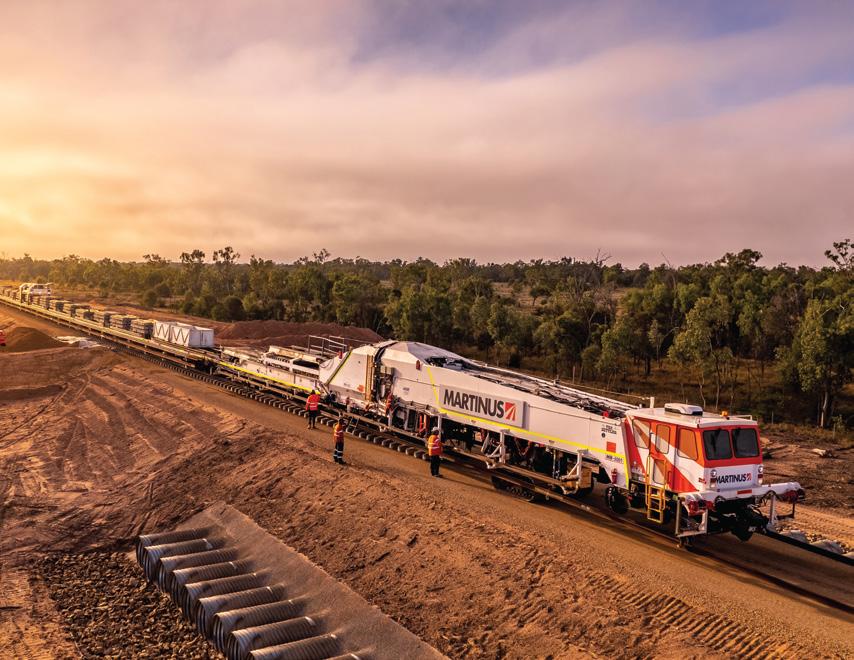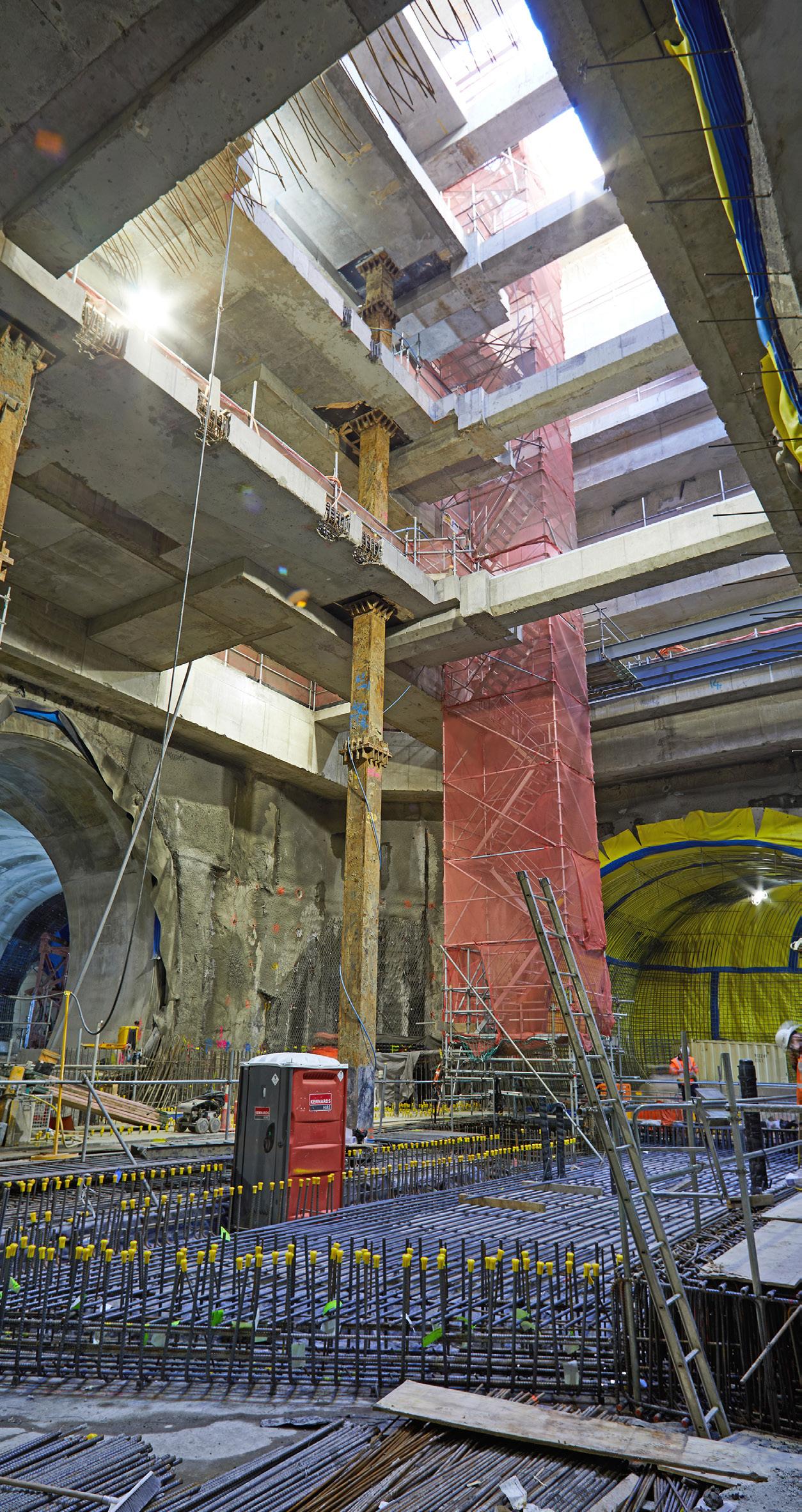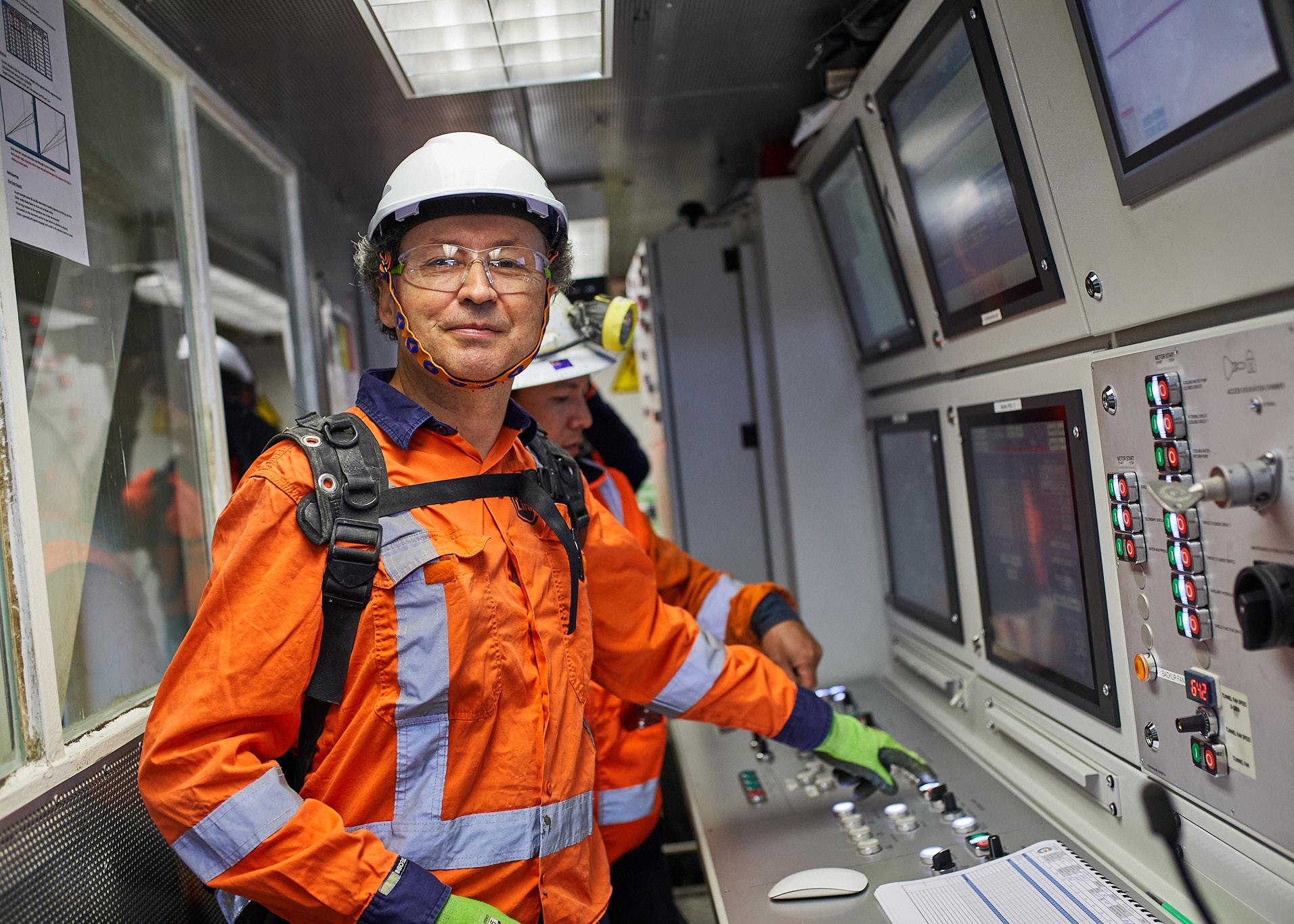THE INFRASTRUCTURE
MEGAPROJECT REDEFINING



AUCKLAND’S TRANSPORT SPACE



MEGAPROJECT REDEFINING



AUCKLAND’S TRANSPORT SPACE


Auckland’s City Rail Link is the largest infrastructure development project ever undertaken in New Zealand’s history. We take a look at Link Alliance, the consortium of companies involved, and speak to Project Director Francois Dudouit about large-scale boring, and an update on the megaproject’s progress
 Writer: Marcus Kääpä | Project Manager: Joshua Mann
Writer: Marcus Kääpä | Project Manager: Joshua Mann
Transport is constantly evolving to become greener, smarter and more efficient, and therefore requires the infrastructure to match.
In Auckland, New Zealand, City Rail Link (CRL) stands as the largest project of its kind ever to have been undertaken in the country and is set to reshape public transport and interconnect the Auckland region. Link Alliance is a consortium of seven New Zealand-based and international companies, including the client City Rail Link Ltd (CRL Ltd), which is delivering the main stations and tunnels for the CRL project.
The consortium also comprises construction partners Vinci Construction Grands Projects, Downer NZ and Soletanche Bachy International, and design partners WSP, AECOM and Tonkin + Taylor, to which the future owners and operators Auckland Transport and Kiwi Rail are associated.
Transport in New Zealand currently relies heavily on roads and to a much lesser extent on air transport. Therefore, there are a lot of opportunities to develop rail infrastructure in a large city like Auckland and across the country, with rail infrastructure seen as one way to decarbonise the economy.
“The CRL is the first underground metro project in New Zealand and can be considered as a pioneer, which is
definitely exciting and motivating,” begins Francois Dudouit, Project Director of Link Alliance.
CRL’s world-class rail system will better connect Auckland’s entire rail network; there will be more trains and journeys will be easier and quicker. The twin 3.45-kilometre (km) tunnels, which have been built up to 42 metres (m) below the Auckland city centre, will connect downtown at Waitematā Station (Britomart) with a re-developed Maungawhau/Mount Eden Station on the Western Line. Two new underground stations will open up central city access: Karangaa-Hape (Karanghape) with entrances at Mercury Lane and Beresford Square, and Te Waihorotiu (Aotea) at Victoria and Wellesley Streets, midtown.
The work will transform the downtown Waitematā Station into a two-way through-station, and once complete, the project will allow the network to run at double rail capacity.

“The CRL is a metro project which will be a game changer for Auckland’s transport network when it opens,” Dudouit continues. “It is a turnkey project which includes the delivery of three stations (two of them being underground), the associated running tunnels, all electrical and mechanical equipment and rail systems, as well as testing and commissioning. It is the first metro project and the largestever transport infrastructure project in New Zealand.”
Honeywell has worked in New Zealand for more than 45 years, supporting key commercial buildings and justice and corrections projects. The company is experienced in critical infrastructure projects such as airports, transport and smart cities.
As a major supplier to Link Alliance, Honeywell will design, supply, test and commission both an Integrated Control System (ICS) and communication system across four CRL stations and tunnels. Honeywell will install its Enterprise Buildings Integrator (EBI) and Building Management System (BMS) solution across the stations to integrate more than 20,000 sensor points in a highly available configuration to provide the CRL operations team with a unified view across all the sub-systems installed in the tunnels and stations.
“We are pleased to expand our work with the CRL team to support this monumental infrastructure project, which will help to transform transportation in New Zealand,” said Michelle Bunting, General Manager, New Zealand Honeywell Building Technologies. “Our team is focused on creating a more seamless control experience for the CRL operations team while also creating a safer passenger experience with more comprehensive communications protocols. We are proud to help Link Alliance deliver New Zealand’s largest transport infrastructure project ever.” Honeywell previously supported upgrades and expansion work at the Britomart Station and has experience with complex subsystem integration projects in New Zealand and across the world.
www.buildings.honeywell.com
Sustainability
Security
Fire & Life Safety
Building Management Systems

OT Cyber Security Services
Honeywell Building Technologies is transforming the way every building operates to help improve the quality of life. Our software, products and services are in more than 10 million buildings worldwide.
We provide connected building solutions that integrate comfort, security, safety and energy efficiency with easy-to-use dashboards that help turn building data into insights to drive results. We’re an industry leader in fire and life safety systems that improve responses to critical situations, and our integrated security systems provide access control, intrusion detection and video management to keep people safer.
For more information, please visit buildings.honeywell.com
CRL will double the number of people within 30 minutes of central Auckland – New Zealand’s biggest employment hub. When fully operational, 54,000 passengers an hour will use CRL stations at peak times. More than 2,000 people are building CRL; according to Dudouit, this project innovation and complexity is upskilling a workforce to benefit future generations, and an alliance delivery model was selected with due consideration to the size of the project, its complexity, and the risks.
“Delivery of the heavy civil works started mid-2019 and has progressed well in a COVID-19 environment with the project now transitioning to delivery of the architectural and system works,” he reveals.
Large-scale tunnelling is a core operation within the project. The parallel tunnels MC30 and MC20, each with a drilled length of 1.6km, are located in the geological area called East Coast Bays Formation (ECBF). In the past, several tunnels had been dug with a tunnel boring machine (TBM) in the ECBF: Orakei Main Sewer, Rosedale Outfall and Waterview Connection. Based on this experience, an earth pressure balance (EPB) TBM supplied by German tunnelling machine manufacturer Herrenknecht AG was selected with a drilling diameter of 7.15m, a maximum pressure (Pm) of four bar, a cutting wheel equipped with ‘rippers’ and cutters for hard layers, and an opening percentage of 44 percent to overcome possible clogging.

“After finishing my engineering studies, in 1986 I started to work on on a tunnel project as part of the Atlantic High-Speed line between Paris and Bordeaux in France. It was my first involvement on a major infrastructure project, and it was very exciting.
“I then started to work internationally in 1990. Since then, I have worked continuously abroad and gained experience on major and challenging infrastructure projects in Denmark, Hong Kong, the Netherlands and Sweden before arriving in New Zealand about five years ago. The great majority of the projects in which I was involved were underground and part of railway infrastructures for metro lines, ‘conventional’ passenger or freight lines or high-speed lines.”

CAN YOU TELL US A BIT ABOUT YOUR EXPERTISE AND EXPERIENCE IN THE FIELD OF INFRASTRUCTURE MANAGEMENT?The Dame Whina Cooper TBM breakthrough at Aotea Station


Spoil, the soil and rock excavated when tunnelling begins, was transported out of the TBM via a conveyor belt with a capacity of 600 tons-per-hour (Tph) and transport within the tunnel was mainly undertaken by electric vehicles (EVs).

“The tunnel lining consists of precast rings, each 30 centimetres (cm) thick and reinforced with steel fibres, with the exception of special areas where reinforced cages were used,” Dudouit elaborates. “There were multiple primary technical challenges when it came to the bored tunnels.
“The first of these was tunnelling on a downward slope of 3.5 percent, and an alignment with a very tight radius (140m), even when starting the TBM. The TBM and tunnel equipment and the tunnel lining had to be designed specifically for such a small radius.”
A passage was also undertaken beneath the most important motorway junction in the city of Auckland (a 200m wide corridor with 11 lanes of traffic). In this area, the TBM
Beyond significant technical and engineering challenges and the innovations required to deliver such a project, Link Alliance has developed a unique and inclusive culture which embraces Māori values. The project has also set itself very ambitious environmental and sustainability objectives.
The integration of decarbonisation into decision-making has yielded a projected 60,500 tons of carbon dioxide equivalent (tCO2e) reduction in total carbon footprint over the CRL’s 100-year design lifespan, a 19 percent reduction in the expected carbon payback time once the CRL is operational to under six years. CRL is projected to reduce Auckland’s transport emissions by 28,000 tCO2e, every year.
To ensure decarbonisation was prioritised by all alliance participants, sustainability was formally integrated across the management system so that all decisions, including design, construction, whole-of-life cost, procurement and change management considered the carbon footprint implications.
Industry-leading decarbonisation measures that have contributed to this reduction include lowering the amount of cement in concrete, changing the mined tunnel designs to reduce excavation works, material reuse, using self-adjusting ‘smart’ lighting and ventilation systems to minimise station operational footprints.
progressed very quickly while being in closed mode, and settlements were limited to two millimetres (mm).
On top of this, there posed the issue of navigating passage regarding the anchors – steel strands cast-in construction supports - of the Aotea Centre, a performing arts and events centre located in the heart of Auckland.
According to Dudouit, these anchors were installed several decades ago during the construction of the Aotea Centre and left in the ground. Investigation work was necessary to ensure the number, position, length, technical characteristics, and that they were no longer under tension. Due to problems of access and utilities diversion, it was hardly feasible to remove the anchors from the surface.











Scott Electrical has been helping electricians get the job done right since 1935. Back then, we were just a single store based in Auckland. Today, we’re one of the largest Kiwi owned and operated electrical wholesalers in the country.
We’ve got the upper North Island covered, with 17 branches from Kerikeri to Rotorua.
We’ve got a close working relationship with a network of wholesalers across the country too. So no matter how big your project or where it takes you, you know you can get the electrical gear you need, when you need it. Learn


The remaining solution was therefore to remove these obstructions from the TBM.
“In order to facilitate this task, the TBM cutterhead was designed with knives and the screw conveyor with many access hatches,” Dudouit explains. “The operating instructions of the TBM have been adapted to this area. The passage of the anchors on both TBM drives was carried out without long stops and the TBM was able to progress at a very satisfactory
Link Alliance includes New Zealand and international companies with a wealth of experience in delivering large-scale infrastructure projects similar to the CRL project both in New Zealand and overseas.
Three of the companies in Link Alliance will focus on the design side of CRL and the other three on construction.
Several of the companies already have some involvement with the CRL.
Link Alliance comprises of:
• City Rail Link Ltd
• Vinci Construction Grands Projets S.A.S
• Downer NZ Ltd
• Soletanche Bachy International NZ Limited
• WSP New Zealand Limited
• AECOM New Zealand Limited
• Tonkin + Taylor Limited
Link Alliance was selected on the basis of a strong proposal that offered an experienced construction management team, and significant commitment to Link Alliance from the executives of the construction firms involved in efficient construction methodology and innovative engineering ideas.
average rate of 10m a day, validating the technical choices.”
The first TBM drive (on the MC30 tunnel) was completed in December 2021. After the start-up phase, the TBM achieved an average rate of 30 percent better than the 15m a day initially planned.
“The lessons learnt on the first drive enabled us to further improve productivity on the second drive, which was completed in September 2022. The TBM and the associated equipment are now fully dismantled,” Dudouit states.
Following the completion of TBMrelated activities at Maungawhau, Link Alliance’s focus shifted to finishing the remaining civil works associated with Maungawhau/Mount Eden Station, namely the station building, train platforms, grade separated structures on the east and west sides, and starting the architectural and systems fit out works.
The North Auckland Line (NAL) works will be completed and both tracks in operation by mid-2023. In previous years, due to the sequencing of the works, trains operated on a single line through the work site. Works will be completed during the block-of-line (BOL), a period when no trains travel on the rail tracks, enabling construction to safely take place unimpeded.
“This was successful thanks to efficient works preparation, the commitment of the team and collaboration with Auckland Transport and KiwiRail,” Dudouit affirms. “To deliver such a complex infrastructure project in a challenging environment, it is key to first invest in people because they deliver the project. It starts by building a culture in which health and safety are at the heart, by investing in wellbeing, training, and developing people’s capabilities and talents.
“We rely on our team to deliver
Exerum unt et reperehento blandi odit incimendam volupta temolla ccuption consequi inctate mquiae. Itam, ipidi ni quistor epelectatio.
Gleeson Group is a New Zealand owned transport and civil infrastructure business that specialises in excavation, bulk haulage, aggregate supply and managed fill disposal.
Ra comnihillam lacearciur apis enti rehenda perumqui test explandist que namendis re pliquia pratincto vitaspe ditiaerecto beriorro experchit ut omnimpore di dolent id ero et odit omnihiliquas doloreculpa
We provide our customers with quality solutions on even the most complex projects and we always deliver.
We do what we say we’ll do. It’s that simple.
• Peris audia que corepudaes afdksakhbashbas
• eatem autat pliquia voluptat
We are happy to have worked alongside the Link Alliance team on the City Rail Project in Auckland providing bulk haulage and disposal of the TBM spoil. With up to 50 of our trailer units assigned every day, our client was able to achieve their programme deadlines.
• untur reicatur am, cum ad ex et quos experis sae apis et aliquiste denieni mollorro esciam, velest tionemque magnatis sandelest as ex ea in et atur, volupta tiistis qui tem. Ita conseque volent.
www.gleesoncox.co.nz
www.websiteaddress.com
Auckland’s CRL project is a large-scale venture that required our in-depth expertise regarding architectural concrete.
“Jackson [Formwork] has been a valuable partner in the building of Maungawhau/Mount Eden station and ventilation buildings, using its state of the art CNC machining technology to produce complex moulds [for] the external panels on the ventilation building, and the feature waterwall inside the Maungawhau/Mount Eden station building. Together, we’ve brought local history and stories to life, and will leave a legacy long after the CRL project has finished.” Robert Potter, Deputy Construction Manager, CRL (Maungawhau/Mount Eden) 2023. jackson.co.nz/formwork






a very significant part of the work that we self-perform, and on our subcontractors to deliver the rest. It is important to establish strong and trustful relations with our subcontractors and suppliers. They should feel entirely part of Link Alliance and motivated to jointly deliver this project as a team.”
For Dudouit, investment in design and works preparation was made ahead of the start of on-site works, as adoption of state of the art processes and equipment, and promoting innovations, are key to the timely delivery and performance of works in a safe environment to reach the required productivity.
CRL aims to make a truly national impact on New Zealand, changing the face of Auckland’s transport infrastructure to accommodate an ever-growing and busy region. Sean
Sweeney, CEO of CRL, stands at the helm of the project, overseeing its progress as the largest of its kind in the country’s history.
Sweeney is an experienced executive with a proven history of leadership over large infrastructure projects in New Zealand, Australia, the US, and Europe. He is an engineer with a PhD in construction economics from the University of Melbourne.
“The CRL is now past the halfway mark, with tunnel boring complete and progressing well in the transition from civils to systems and the fit-out of the stations and tunnels,” he tells us.

The logistics for the tunnel fit out include more than 16km of rail track, 816km of signal cables, 247km low voltage cables, 86km traction cables, 74km cable containment, more than 5,100 square metres (m2) of metal cladding and more than 4,000m2 of glazing.
Legacy is working with Link Alliance on the Appendix26 civil works portion of the City Rail Link project Britomart Station.
Work involves construction of basebuild infrastructure for redevelopment of Britomart into a two-way through station, working amongst challenging logistics, handling building materials (reinforcing, blockwork, palletised concrete, structural steel) 12m below GL within restricted access areas; upgrading infrastructure to the station roof, housing a new transformer and the complete exterior Heritage Restoration of the Chief Post Office building.
Legacy has established high credibility with key stakeholders delivering high risk infra-development within live environments.
www.legacyconstruction.co.nz
Mechanical Support Systems is New Zealand’s only locally owned designer, manufacturer, and installer of cable containment solutions with our factory located right here in Auckland.
We’re proud to work with Link Alliance to deliver smart and effective cable containment solutions that will stand the test of time. With over 17-years’ experience, and an exceptional reputation for delivery, we’re the trusted choice to make cable containment easy.
So, if you’re looking for better cable containment solutions, call the specialists at Mechanical Support Systems.
mechanicalsupport.co.nz
“THE CRL IS A METRO PROJECT WHICH WILL BE A GAME CHANGER FOR AUCKLAND’S TRANSPORT NETWORK”
– FRANCOIS DUDOUIT, PROJECT DIRECTOR, LINK ALLIANCE




For Sweeney, the importance of the CRL to Auckland’s social, commercial, and economic health cannot be overstated. It’s appropriate that public transport and investment in transport infrastructure are issues attracting attention in local and national debates.
“There is a large range of diverse challenges facing Tāmaki Makaurau (Auckland) and many of those are centred around population growth, with Auckland forecast to top two million people by 2033,” Sweeney informs us. “Effective and efficient public transport is the great enabler of great cities.
“It accelerates investment across the commercial and social economies, bolsters the arts, events, retail and
hospitality sectors, and creates new businesses and new jobs. Highly effective, efficient, accessible public transport is a key enabler in any ‘international standard’ city and the CRL will be the catalyst for that important change in Auckland.”
CRL will deliver a multitude of benefits to the area including a world-class underground rail network capable of coping with up to 54,000 passengers per hour; doubled capacity across the rail network; a train arriving at a CRL station in less than 10 minutes; improved travel options and twice the number of Aucklanders within 30 minutes of the central business district (CBD).
Supporting New Zealand’s finest infrastructure!

Moddex NZ is proud to partner with Link Alliance on the CRL project and looks forward to supporting the project as it evolves.
Moddex’s off-site manufacture process and pre-engineered handrail and balustrade systems are proving their worth on this project, with fast and hassle-free installs falling well within block of line timeframes.
Moddex has brought time and cost savings to the table for Link Alliance. Our proprietary systems were an excellent value engineered option to replace the custom designs that were detailed and documented.
www.moddex.com
PFP Systems has an enviable reputation in providing effective solutions to the most complex challenges in passive fireproofing, industrial precision grouting, pipeline coatings and tank linings. Together with our technical expertise, we’ve become widely recognised as an industry leader in managing difficult to handle materials and complex delivery systems.
PFP Systems are registered to ISO 9001 and ISO 14001 quality and environmental management systems and are active members of the Australasian Corrosion Association and Fire Protection Association of NZ. PFP Systems also maintain the Sitewise Green status.
www.pfpsystems.com
“EFFECTIVE AND EFFICIENT PUBLIC TRANSPORT IS THE GREAT ENABLER OF GREAT CITIES”
– SEAN SWEENEY, CEO, CRL



PFP Systems has been at the forefront of passive fireproofing and protective coatings applications in Australasia for over 20 years. PFP Systems maintain crews and equipment in Australia and New Zealand. The PFP Systems team have successfully completed projects in a variety of industries, namely, Oil and Gas, Infrastructure, Marine and Construction. PFP Systems’ projects include relining culverts, bridge remediation, construction fireproofing, wastewater plant linings, pipe coating, tank lining, bridge pile grouting, compressor base installation and offshore platform fireproofing.

The current boom in the construction industry places huge demand on the available skills in the market to meet ambitious design, quality, and project timelines.
Finding the right companies and products to achieve these goals is a constant challenge.
Tray-dec NZ and Nelson Stud Welding have serviced the construction sector for over 50 years. Our professional teams consult, manufacture, project manage and install bespoke steel composite flooring solutions.
This iconic project had a specific requirement for ZAM™ steel composite flooring to meet life-cycle costs; Tray-dec met this challenge.
T 09 820 9133
E info@traydec.co.nz
www.traydec.co.nz
“The CRL will also deliver significant economic benefits. A PwC analysis found the CRL will deliver total economic benefits of NZD$11.9 billion in the 60 years from 2022,” Sweeney tells us. “The biggest impact is on travel time for public transport users, which PwC has assessed as delivering NZD$4.543 billion in benefits across the next 60 years.”
Agglomeration benefits worth NZD$4.229 billion are also being delivered via the project. Agglomeration is a broad-based measure that accounts for the additional employment density and business investment which is expected to occur with the CRL. This leads to a corresponding lift in GDP as a result of increased productivity and economic output.
“The significant economic benefits serve to reinforce the importance of the project and more than justifies the public expenditure to complete it,” Sweeney adds.

If you need a lift, call Hi Lift A family owned company established in 1982 with a highly experienced and qualified team, the combined industry knowledge within Hi Lift Cranes cannot be rivalled, so contact us with confidence.


The company has a key group of experienced crane operators and management staff with a vast collective industry knowledge. Our yard is conveniently located in central Manukau City which means we can shift cranes, plant and resources to most locations quickly and efficiently.





Link Alliance is a truly international organisation with people employed by many different companies from both New Zealand and overseas. Team members are inducted into the alliance from a range of technical disciplines to deliver the overall programme of works for the CRL project.



The alliance’s induction helps team members understand the project scope, who is part of the team, what the project’s core objectives are, how an alliance works, and the
importance of the alliance charter – the document which sets out the project’s overarching mission, values and accepted behaviours for working together as one team. The project’s mission is to ‘transform Auckland with a rail network people love to use’.
Key values include Hui ē tāiki ē (working together as one team where trust, respect, collaboration and inclusion are valued); Pono tauutuutu (holding each other accountable through being reliable, responsible, decisive and committed); Aroha tauutuutu (Caring for each other through wellbeing initiatives,
being supportive, making work enjoyable and being mindful of the wider community), and Marohi te tū (being inspired through passion, empowerment, being courageous and proud of the project they are all delivering).
“The day-to-day operating rhythm of the alliance provides people with opportunities to openly participate in a range of toolboxes, meetings and other team forums,” Dudouit details. “These forums acknowledge people’s individual and collective efforts through Charter Champion awards. Anyone in the team can nominate a

MGE is an expert in the switchboard industry, redefining the reliability and quality of switchboard products. MGE is an Auckland and Whangarei based switchboard engineering facility. The business caters to all segments of the switchboard manufacturing market with special emphasis on solutions that require high-level engineering such as motor control centres and power distribution switchboards for commercial and industrial applications.

MGE is proud to be part of the LKA CRL project for supplying the LV Switchboards.





Safe for underground services, avoid service strikes, ensure worker safety, work done on time to schedule
www.winstoneaggregates.co.nz





Leaders in the New Zealand quarrying industry, providing sustainable solutions that build the foundations of the communities we live in.
person or team for going above and beyond - whether it be living one of the charter values, collaborating with others to achieve a milestone, focusing on a key project objective or delivering a health and safety initiative – and these people are acknowledged and recognised in front of their peers.”
CRL is one of New Zealand’s few megaprojects that has the opportunity to significantly contribute to the legacy of the wider construction industry. Training and providing team members with learning opportunities are at the heart of Link Alliance’s recognition efforts to empower team members.

Significant time and energy support people to develop as leaders including leadership coaching and a focus on being constructive, upfront and solutions-driven. A bespoke
training centre gives new team members a hands-on experience to learn about health and safety before they start work on-site. On top of this, upskilling opportunities enable people to progress both within the alliance but also in the future when they move on to other projects and opportunities.
“Our Wellbeing Team focuses on people’s wellbeing across all work sites and champions a supportive workplace for our people as well as building resilience to cope with an ever-changing environment,” Dudouit tells us proudly. “A range of wellbeing
initiatives are undertaken each year to empower people to look after themselves, their work colleagues and their families.
“Examples include diabetes and blood pressure health checks, skin cancer awareness, fundraising for charities, blood donations, family days, touch rugby teams, bike rides, care packages and regular gatherings onsite where people celebrate and enjoy team successes together.”
Information about the alliance’s wide-ranging social outcomes initiatives is available at https://www. cityraillink.co.nz/social-outcomes.
“OUR WELLBEING TEAM FOCUSES ON PEOPLE’S WELLBEING ACROSS ALL WORK SITES AND CHAMPIONS A SUPPORTIVE WORKPLACE FOR OUR PEOPLE”
– FRANCOIS DUDOUIT, PROJECT DIRECTOR, LINK ALLIANCE
At WorkCare New Zealand, we work diligently with you to eliminate drug and alcohol issues in your workplace. This improves your workplace environment, which leads to a more productive business.



CRL railway works are to be carried out in two distinct environments, the first defined by the newly built structures (“greenfield”) and the second near tracks in circulation of the NAL. The phasing of the works is then dependent on the scheduled block of lines (planned periods without traffic) and takes place within a very strict regulatory framework.
On the sites, heavy civil works are now close to an end, and architectural and systems fit out works have commenced. This transition is an important phase in the life of the project and has required great attention upstream in the design phases of the civil and systems packages, engineering, and preparation of the works, in order to ensure that the integration is successful and that the project progresses as planned.
“Moving to the testing and commissioning phase is another critical transition. This phase is scheduled to start in 2024,” Dudouit explains. “The rail system teams integrated into the project are already working to define the tests, in order to validate the nominal operation subsystem by subsystem in interaction with the other subsystems.

“Although it is the future heart of Auckland’s rail network and will fundamentally change the dynamics of this network towards a metro-type operation, CRL must be primarily considered from a technical perspective as a network extension. In particular, the technology of the main systems, such as signalling, is unchanged. The rolling stock supplied by Auckland Transport is the same, which limits the risks during the testing and start-up phases.”
The establishment of the test plan is done in collaboration with the
future owners and operators of the CRL (two entities that participate in Link Alliance): Auckland Transport for the stations and KiwiRail for the rail infrastructure, in order to secure the testing and commissioning process and the success of handing over the largest transport infrastructure network in New Zealand.
CRL represents a step forward in the nation’s infrastructure transport space, helping connect people across the Auckland region with a greater, greener and more efficient system. Estimated to be capable of transporting tens of thousands of passengers per hour, CRL will be an open and accessible network for all, bettering the lives of commuters and visitors alike.
“It is not about putting people down, it’s about picking people up”Learn More

